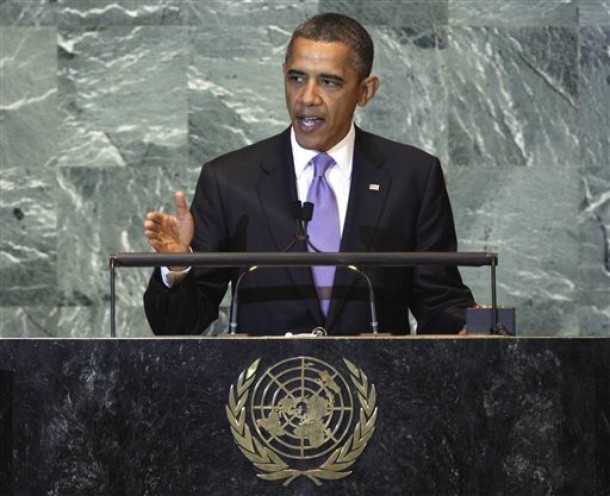
From Matt Spetalnick and Laura MacInnis, Reuters: President Barack Obama sought to ease doubts about his leadership on the world stage on Wednesday as he confronted a looming diplomatic crisis in the Middle East and hailed popular revolts shaking the Arab world.
Obama attempted to reassert his credentials as a world statesman in an address inside the cavernous U.N. General Assembly hall even as he grappled with high unemployment and low poll numbers at home that threaten his re-election bid. . . .
Even as the approaching U.N. showdown overshadowed Obama’s agenda, he sought to rally fellow leaders for concerted action to spur the sagging global economy. He also kept pressure on the Europeans over the euro zone debt crisis.
Obama held a marathon round of bilateral talks with new Japanese Prime Minister Yoshihiko Noda, British Prime Minister David Cameron and French President Nicolas Sarkozy.
"We stand with our European allies as they reshape their institutions and address their own fiscal challenge," Obama said in his speech.
For their part, other leaders are concerned about political dysfunction in Washington underscored by a bipartisan brawl over debt and deficits this summer that led to a downgrade of America’s top-notch credit rating. . . .
Foreign policy has slipped down his policy list, a trend not lost on fellow leaders trying to fathom how much of a role Obama intends to play in world affairs. A key example was Obama’s decision to keep U.S. forces mostly in a support role in the NATO bombing campaign that helped oust Libyan leader Muammar Gaddafi.
Obama has drawn criticism for what has been seen as a slow and uneven response to the "Arab spring" uprisings engulfing friends and foes alike, and Republicans say his "leading from behind" approach undermines U.S. global prestige. (photo: AP)
Image: ap%209%2022%2011%20Barack%20Obama%20UN.jpg
